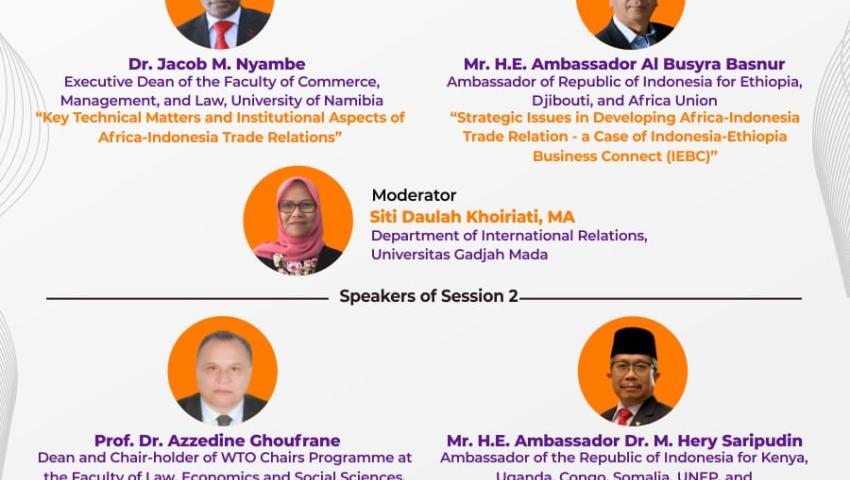Africa-Indonesia Trade Relations: Current Status, Strategic Issues, and Future Trajectories

Tuesday, December 7, 2021
Indo-Africa Centre & Center for World Trade Studies
Universitas Gadjah Mada
Web Based International Seminar
Africa-Indonesia Trade Relations: Current Status, Strategic Issues, and Future Trajectories
Date: Wednesday, December 8 th 2021 (2-5 PM GMT+7 / 9 AM-12 PM GMT+2)
In early 2021, Indonesia through the Embassy of the Republic of Indonesia (KBRI) in Pretoria reached a cooperation agreement with the implementing agency of the African Union Development Agency-New Partnership for Africa's Development (AUDA-NEPAD) to accelerate the development of its country members—such as the Republic of South Africa, the Republic of Botswana, the Kingdom of Eswatini and the Kingdom of Lesotho, which are the accredited countries of the Indonesian Embassy in Pretoria and members of the African Union. The agreement emphasizes its ongoing priority agenda, namely capacity building for human resources, economic integration, and regional industrialization. This is part of the effort to implement the African Continental Free Trade Area (AfCFTA) trade pact, which has officially started on January 1, 2021, with the main goal of increasing the welfare of the African people through GDP growth, job growth, reducing trade deficits, and increasing intraregional trade in Africa by eliminating import duties and non-tariff barriers.
Two years earlier, Indonesia had first tried investment opportunities in the field of vaccine production through BioFarma in Tanzania and Nigeria, as well as in the mining of tin and derivative minerals in Nigeria by PT Timah Tbk in a joint venture scheme with a planned initial production capacity of 5,000 metric tons. In a more recent development, Indonesia is targeting to increase the export value of spices and herbs, as well as presenting a total of 4,000 Indonesian restaurants in several potential countries including some in Africa. This program is a plan for Indonesia to catch up with spice exports, one of which is Thailand that is more active in Africa. These illustrations briefly show how Indonesia is active and serious in exploring non-traditional trade cooperation in Africa. In a note published in 2020, the International Monetary Fund (IMF) stated that intraregional trade is still relatively low in the African region. Most countries in Africa are said to lack a trade-hub so that only a few countries such as South Africa, Nigeria, Ghana, Ivory Coast, Kenya and Egypt can become centres of trade networks between neighbouring countries. The many characteristics of trade regimes that have been established between neighbouring countries and continents without being accompanied by strong enforcement of rules also make it possible for the same member countries to take part in different trade arrangements, causing complexity and uncertainty in implementation. In addition, several obstacles such as high non-tariff barriers, low logistics quality, and financial infrastructures that are not yet fully developed also add to the series of obstacles for Africa in implementing trade programs, both between neighbouring countries and with intercontinental partner countries. In such situations, it is interesting to discuss further about how Indonesia and African countries are getting ready to implement future trade arrangements and opportunities, in addition to several agreements that are already implemented. Apart from being a potential area for export and production, to what extent does Indonesia measure the potential of workers and infrastructure capacity of partner countries in Africa and vice versa, assuming previously that export and production activities could generate profits? In relations to the many characteristics of trade regimes in Africa and Indonesia and its regional integration scheme under ASEAN Economic Community, how are Indonesia and African countries contribution—in the form of plans and implementation processes—to improve overlapping trade chains in order to bring out the potential of other countries to be active in the trade supply chain and its potentially-embedded production networks and value chains?
The following topics are therefore needed to be explored, i.e. to include but are not limited to:
● Current status and state of play of key trade technical matters and institutional aspects, such as digital inventory design of commodities export-import; relevance of Standards and Trade Development Facility (STDF)—esp. technical and sanitary/phytosanitary—in non-tariff policy and measures (i.e. whether they are barriers or opportunities to trade); capacity aspects of forward integration and backward integration between trading partner countries; capacity of the political institution as supervisor of the trade program implementation; and mobility and welfare of workers in the centre of trade network
● Strategic issues in further deepening Africa-Indonesia trade relations, particularly to elaborate the two sides initiatives in strengthening bilateral trade relations, such as exemplified in the cases of Indonesia and Ethiopia’s digital platform called Indonesia-Ethiopia Business Connect (IEBC) as a bridge to communicate with each other related to trade issues between both countries and Indonesia strategic partnership with South Africa aiming to design a post-pandemic commercial relation between both countries.
● Future trajectories of Africa-Indonesia trade relations, i.e. to discuss opportunities to develop Preferential Trade Agreement (PTA), in which Indonesia has signed 4 (four) PTAs with Mozambique, Tunisia, Djibouti, and Mauritius since 2017 and is planning to sign other PTAs with more countries and institutions, such as: ACU (Southern African Customs Union), ECOWAS (Economic Community of West African States), EAC (East African Community), Egypt, Morocco, Madagascar, and Democratic Republic of Congo)

